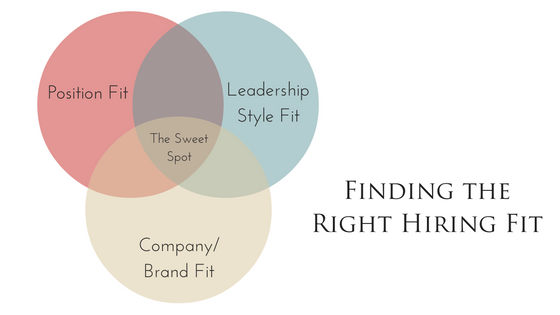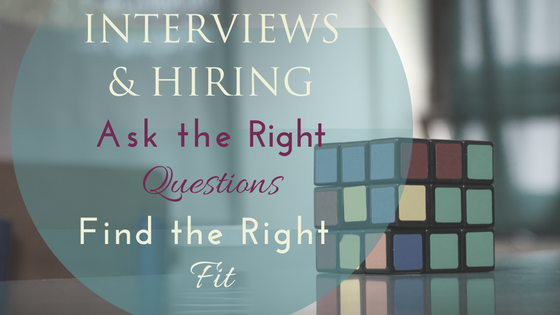Is it time to hire some help for your team? Perhaps you’ve been going it alone for quite some time, but now you’ve realized that this pace can’t keep up without someone’s help. Or maybe you’ve hired people in the past but always felt a bit “hit or miss” about whether they were really the right person for your needs.
Finding people who are a “Good Fit” for your team can feel daunting at times… either because you’ve never hired people before or because you don’t have a solid hiring and interviewing process.
This issue of “fit” is critical to the success of your new hire, but how do you figure out whether someone is a fit? It’s all in the questions you ask… like so many things in our lives we only get answers to the questions we ask. So, if hiring is in your future, then let’s talk a bit about how you can develop stellar interviewing questions that will help you find the team member you’ve been praying for.
It’s All in The Story
When you’re considering hiring a new team member you know you’ll be talking with a variety of candidates, and they all want to connect with you and (likely) impress you so that they might get the job. Therefore, part of what they’re geared to figure out is … what do you want to hear?
They want to give you answers in the interview that sound good and make them seem insightful and capable. The problem is that many of those answers are based on fantasy… what they hypothetically could do or think you’d want them to do in certain circumstances. However, once they’re in the job and getting busy, they’re likely to going to go back to doing whatever they had learned to do before.
That’s why the most important questions you can ask invite your candidates to tell you stories about situations they’ve already experienced. In the land of human resources these are called “Behavior-based Interviewing” questions. In other words, they are asking the candidate to tell you a specific story about how they handled a certain kind of situation in the past. It’s illuminating their existing behaviors, competencies, and skills.
So, rather than opening up the floor to have them share what they think you want or expect to hear, these questions invite them to provide specific examples of experiences when they had to use certain skills. Let’s give a few examples…
- Tell me about a time when you built rapport with a difficult customer?
- We all let things fall through the cracks from time to time. Tell me about a time when that happened to you and what changes did you make to ensure better follow up in the future?
- Describe a recent situation in which attention to detail was critical to success. How did you contribute?
Do you see how each of these questions is inviting the candidate to share a story that illustrates a specific skill set? The first is about customer service skills, the second about follow-up and project management skills, and the third about attention to detail.
There are SO MANY potential skills or competencies that you might want to interview for as part of your hiring process. In fact, I highly recommend that you pick up a copy of How to Choose the Right Person for the Right Job Every Time by Lori Davila and Louise Kursmark, which was my first resource on behavior-based interviewing and has become my constant go-to every time I’m developing a new position within my company.
I particularly love that book because it offers a chapter that walks through 50 different possible competencies you might want in a new hire and gives you several interview questions you could ask to help identify if a candidate has that competency.
So… I imagine that you get how important I think these behavior-based interview questions are, but let’s turn back to the topic of “fit” and how to find someone who has it.
Three Kinds of “Fit”
The challenge is that finding someone who’s a fit for your company is rather like a venn diagram with three sections.

In order for someone to be a “Right Fit” for you to hire, there are three aspects of fit that you want to question them around:
- Position Fit – Do they have the needed skills and competencies to do this job.
- Leadership Style Fit – Will they be a match for your leadership style.
- Company/Brand Fit – Do they have a sense of your company’s vision, mission, brand and do they align easily with those qualities.
The position fit questions are the ones that most people think of immediately, and those are definitely areas that the book I mentioned above can help you find good questions for. Generally, I choose 6-8 competencies that seem critical to success in this position and select questions that would highlight the candidates experience in those areas.
Leadership Style Fit
Leadership style fit requires a certain amount of self-awareness on your part. Are you the kind of leader who wants strong people who will think independently, question your process, and help you innovate your company? Or do you prefer to have learners who will soak up your training, internalize your values and priorities, and aim to match your energy and strength? Or perhaps you want want collaborative partners who’d love to toss ideas around with you, get curious about new possibilities, and then aim for a consensus to move forward together.
There are so many different leadership styles. However, you have to know what works for you as the leader. If you think that you want strong independent thinkers because that’s what you are, then don’t be surprised if you start butting heads with your new team members. That might lead to break-throughs or breakdowns… hard to say.
However, think about any context in which you’ve lead teams before. Other positions in your career, sports teams, volunteer committees, even in your family. Who did you get along best with and feel empowered around? Those are the folks that might give you clues both to your leadership style and to the qualities of your potential new hires that would be a “leadership style fit” for you.
One of the best questions to ask to illuminate leadership style issues is “Who was the best boss you ever had and what made them so great?” If they describe situations and interactions that you could imagine having yourself, then that’s a good sign. If what they describe sound foreign or odd to you, then maybe not so much. You can also ask them to tell you about the most successful team that they’ve ever been on and what do they think made it work? That might show some more details about they’re working style and what’s important to them in their colleague interactions.
Company or Brand Fit
Company or brand fit is an even more amorphous question. First, you need to have a clear understanding about the company brand and culture for yourself. What kind of experience do you want your team members to have when they are working with you, with each other, with your clients? How would it feel? What might that look or sound like?
If your company culture or brand are warm and fuzzy, then you won’t want to hire someone who’s got a real martial approach to getting things done and who lacks understanding and compassion. Similarly, if you’re a real focused, driven company or brand, then someone with a lazy surfer’s attitude to deadlines and details simply won’t succeed in your world.
This issue of company culture and brand fit sometimes requires listening to your instincts and intuition about someone. They might appear to be a great candidate for the position and potentially even a match for your leadership style, but if this element is off then they’re unlikely to stay with you for long.
So, you’ll want to ask questions like:
- What’s most important to you in the context of your work?
- Have you ever worked for a small company? What do you imagine that would be like?
- What kinds of things do people do that rub you the wrong way?
These questions will illuminate some of their core values in the context of work and allow you to recognize possible mis-fits more easily.
(As a side note, there are a handful of questions that it’s illegal to ask. Mostly about various “protected classes” such as age, religion, marital and family status, sexual preference, etc or other personal private behaviors. Here’s a useful article about seemingly innocent questions that you definitely shouldn’t ask. If hiring is new to you, then definitely do some of this research just to avoid any unexpected unpleasantness.)
Next Actions
If you’re serious about starting your hiring process, then I know this all might sound very complicated. Really, it’s not. All you need is a little up-front planning for your interview questions to recognize your best candidate more easily.
I’m going to close with some of the best advice ever given to me around hiring: “Hire Slowly, Fire Quickly.” Take plenty of time during the hiring process to ensure that you will be investing your time and training energy into the best candidate you can find. In other words, that friend of a friend who fell in your lap… is likely not the best candidate you could find. Include them among other candidates and see how they measure up.
Then, if things aren’t working out, for whatever reason, end it quickly. Don’t let a bad fit drag you down and drive you crazy. You’re better starting over with a new batch of candidates than draining your valuable time and energy on someone who’s just not getting it.
If you’re ready to get started developing your hiring process, then pick up the book How to Choose the Right Person for the Right Job Every Time, and start brainstorming your interview questions to help you find the right new teammate!
If you’re interested in hearing more about this topic, then here’s a FB live Mini-Training where I talk more about it:




Really useful, clear and complete. Well written!